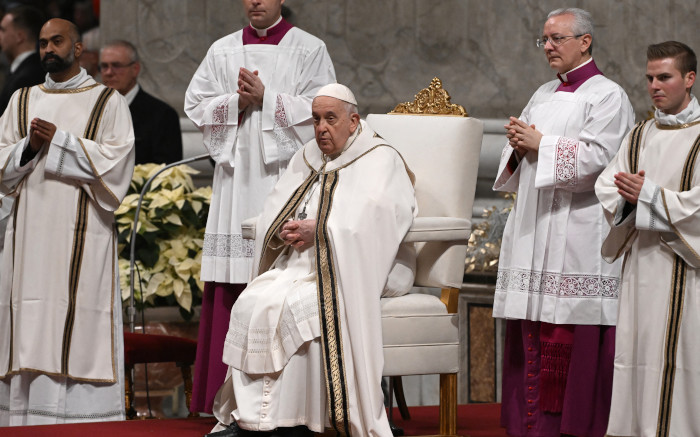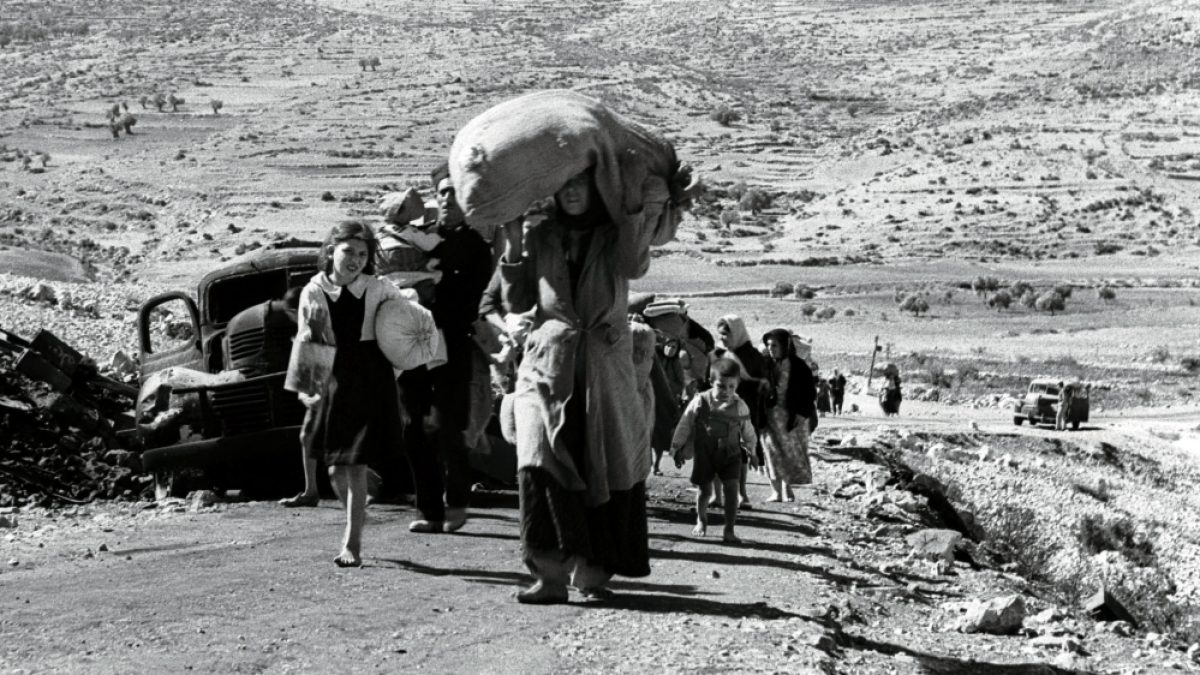
MOSCOW (AP) — Russian President Vladimir Putin said Thursday that there will be no peace in Ukraine until the Kremlin realizes its goals, after nearly two years of fighting that has sent tensions between Moscow and the West soaring have driven, remained unchanged.
At a year-end press conference that lasted more than four hours and gave him an opportunity to consolidate his grip on power, Putin gave some rare details about what Moscow calls his “special military operation.”
He rejected the need for a second wave of mobilization of reservists to fight in Ukraine – a move that was deeply unpopular. He said there were about 617,000 Russian soldiers there, including around 244,000 soldiers called up to fight alongside professional forces.
“There will be peace if we achieve our goals,” Putin said, repeating a frequent Kremlin line. “The victory will be ours.”
Putin highlighted Russia’s military successes in Ukraine as the conflict’s second winter approaches.
“Almost along the entire line of contact, our forces, to put it modestly, are improving their positions, almost all of them are in the active phase of operations, and the position of our troops is improving all the time,” he said.
“The enemy has announced a major counteroffensive, but he has achieved nowhere,” Putin added, claiming that the recent Ukrainian attempt to establish a bridgehead on the eastern bank of the Dnieper also failed and Ukrainian troops suffered heavy losses.
He claimed Kiev was sacrificing its troops to show its Western sponsors some success in seeking more aid.
“I think it is stupid and irresponsible on behalf of the country’s political leadership, but it is their business,” he said.
Putin, who has been in power for nearly 24 years and announced last week that he was running for re-election, was greeted with applause as he arrived at the hall in central Moscow. Last year he did not hold his traditional news conference after his military failed to take Kiev and when the Ukrainian army recaptured lost territory.
But as Ukrainian President Volodymyr Zelensky pleaded for more US aid in the face of a faltering counteroffensive and fragile Western support, he decided to face reporters again – even though the session is heavily choreographed and offers more spectacle than control.
It was the first time since fighting began in Ukraine that Putin answered questions from Western journalists. In addition to those from journalists, ordinary citizens were also able to submit questions, and Russian media said at least 2 million questions were sent in advance.
The press conference began with questions about Ukraine and highlighted some Russians’ fears of another wave of mobilization.
“There is currently no need” for mobilization, Putin said, with 1,500 men being recruited every day. As of Wednesday, 486,000 soldiers had signed contracts with the military, he said.
His comments about further mobilization were met with skepticism by some independent Russian media. They pointed out that he had promised not to call up reservists for Ukraine, but then changed course and ordered a “partial” call-up. The move, which he announced in September 2022, caused thousands of Russians to flee the country.
He reiterated that Moscow’s goals in Ukraine – “denazification, demilitarization and a neutral status” of Ukraine – remain unchanged. He had laid out these loosely defined goals the day he sent troops in February 2022.
The “denazification” claim refers to Russia’s false claims that the Ukrainian government is heavily influenced by radical nationalist and neo-Nazi groups – a claim derided by Kiev and the West.
Putin has also called for Ukraine to remain neutral and refrain from joining NATO.
He reiterated his claim that much of modern-day Ukraine, including the Black Sea port of Odessa and other coastal areas, was historically part of Russia and was given away by Soviet founder Vladimir Lenin.
While Moscow had accepted the new reality following the collapse of the USSR in 1991, Putin said he was forced to respond to what he described as an attempt by the West to turn Ukraine into a tool to challenge and threaten Russia.
“Russians and Ukrainians are one people, and what is happening now is a huge tragedy, a civil war between brothers who are on opposite sides,” he added.
Putin’s last press conference came in 2021, when the US warned that Russia was about to send troops to Ukraine. He postponed an annual State of the Union address until February 2023.
Relations with the US have since sunk to new lows as the conflict continues. Russia arrested Moscow-based US journalist Evan Gershkovich in March.
Shortly before Putin spoke, a Russian court ruled that Gershkovich, 32, must remain behind bars until at least January 30.
US citizen Paul Whelan, a security manager from Michigan, has also been imprisoned in Russia since his arrest in 2018 on espionage charges.
Russia recently rejected an offer to bring home Gershkovich and Whelan, both of whom the U.S. government ruled were wrongfully imprisoned.
“We do not refuse to return them,” Putin said on Thursday, adding that he wanted to reach an agreement, but “it is not easy.” He declined to elaborate but said Washington must “hear us” and make an offer that would satisfy Russia.
Regarding the war between Israel and Hamas, Putin once again lamented the deaths of thousands of women and children in the Gaza Strip, referring to UN Secretary-General Antonio Guterres, who described the Gaza Strip as a “graveyard for children.”
Putin pushed for stronger efforts to protect civilians and called for more humanitarian aid. He added that Russia had proposed setting up a field hospital in Gaza, near the border with Egypt, but Israel had responded that this was unsafe. He reiterated the call for the implementation of a UN resolution to create a Palestinian state with East Jerusalem as its capital.
Putin appeared calm and relaxed when asked questions, although he often cleared his throat and blamed the air conditioning. The event is aimed primarily at a domestic audience, giving them the opportunity to personally engage in solving the problems of ordinary Russians and strengthening their authority in the run-up to the March 17 elections.
In response to a final question about what kind of warning he would have given himself from today’s perspective at the start of his first term in office in 2000, Putin replied that he would have warned against “naivety and excessive trust in our so-called partners.”
He also answered questions from children in Russian-annexed Crimea about the leaky roof and mold in their gymnasium, and from a woman who contacted “my favorite president” to complain about rising egg prices. Putin apologized and blamed “an error in the government’s work” for not increasing imports quickly enough.
Hours before Putin’s arrival, journalists were queuing in freezing temperatures to enter the hall. Some wore traditional clothing, including elaborate hats to attract his attention, or held up identification signs.
Although the event is tightly controlled, some online questions appeared on screens around the hall, which Putin ignored.
“Mr. Mr. President, when will the real Russia be the same as the one on TV?” One text message said, apparently referring to the Kremlin’s control of the media, which portrays Putin positively and glosses over the country’s problems.
Another read: “I would like to know when our president will pay attention to his own country? We have no education, no healthcare. The abyss lies before us.”
Putin was asked whether he uses body doubles by an artificial intelligence version of himself that spoke with his face and voice – a topic about which some Kremlin watchers are heavily speculating. Putin rejected the suggestion.
“Only one person should look like me and speak with my voice – that person will be me,” he said in a deadpan tone: “By the way, this is my first double.”
___
This story has been updated to correct that 244,000 is the number of troops called up for combat and stationed in Ukraine, not the total number there.
___
Associated Press writers Emma Burrows in London and Dasha Litvinova in Tallinn, Estonia, contributed.






Recent Comments